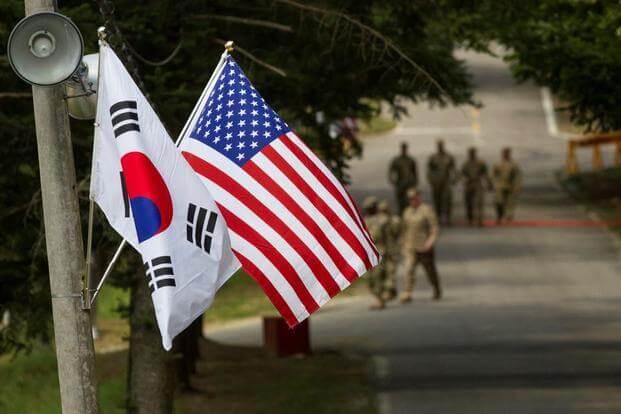This article by Jared Keller originally appeared on Task & Purpose, a digital news and culture publication dedicated to military and veterans issues.
The U.S. military has ordered a mandatory quarantine for any service members based in Korea who have visited China in the last two weeks as Wuhan coronavirus continues to spread across the globe.
U.S. Forces Korea announced on Sunday that the command is implementing a 14-day "directed self-quarantine" of any and all U.S. service members who have returned to South Korea from mainland China between Jan. 19 and Feb. 2.
According to a command statement, the quarantine is required for all affected service members "regardless if they reside on or off USFK installations" and "highly encouraged" for military families, DoD civilians, contractors, and other related personnel.
"We are taking all appropriate precautionary measures to prevent any potential spread of the virus," USFK commander Army Gen. Robert Abrams said in a Sunday tweet. "Key for everyone is to follow standard hygiene protocols, and if not feeling well—get screened ASAP!"
News of the quarantine comes as the Defense Department plans on providing shelter at four stateside military bases for 1,000 government officials and family members quarantined due to exposure to the Wuhan coronavirus.
They join the 195 Americans who fled Wuhan, China last week and are now quarantined at March Air Reserve Base in Ontario, California.
Like those evacuees, self-quarantined U.S. service members in South Korea will remain isolated for 14 days — the incubation period of the coronavirus — "regardless if they display symptoms or not."
"USFK continues to stress that the overall risk to USFK personnel remains low, but the quarantine measures implemented are out of an abundance of caution to mitigate risk to the USFK population," the command said in a statement.
The Wuhan coronavirus has killed 305 people and sickened more than 14,500 across Asia, according to the New York Times. There are currently 15 reported cases in South Korea.
There are nearly 28,500 U.S. service members stationed in South Korea under USFK.
There is no vaccine yet to prevent coronavirus infection. The CDC recommends taking everyday preventive measures to stay healthy, including the following:
- Wash your hands often with soap and water for at least 20 seconds. Use an alcohol-based hand sanitizer that contains at least 60% alcohol if soap and water are not available.
- Avoid touching your eyes, nose, and mouth with unwashed hands.
- Avoid close contact with people who are sick.
- Stay home when you are sick.
- Cover your cough or sneeze with a tissue, then throw the tissue in the trash.
- Clean and disinfect frequently touched objects and surfaces.
If you have been to China in the last 14 days and feel sick with fever, cough or difficulty breathing, CDC recommends the following:
- Seek medical care right away. Before you go to a doctor's office or emergency room, call ahead and tell them about your recent travel and your symptoms.
- Avoid contact with others.
- Not travel while sick.
- Cover your mouth and nose with a tissue or your sleeve (not your hands) when coughing or sneezing.
- Wash hands often with soap and water for at least 20 seconds to avoid spreading the virus to others. Use an alcohol-based hand sanitizer that contains at least 60% alcohol if soap and water are not available.
This article originally appeared at Task & Purpose. Follow Task & Purpose on Twitter.
More articles from Task & Purpose:
• Taliban attacks in Afghanistan are at their highest level in a decade
• The F-35 is an overpriced lemon that doesn’t work
• A federal grand jury is looking into the suspicious deaths of 11 veterans at a single VA clinic












